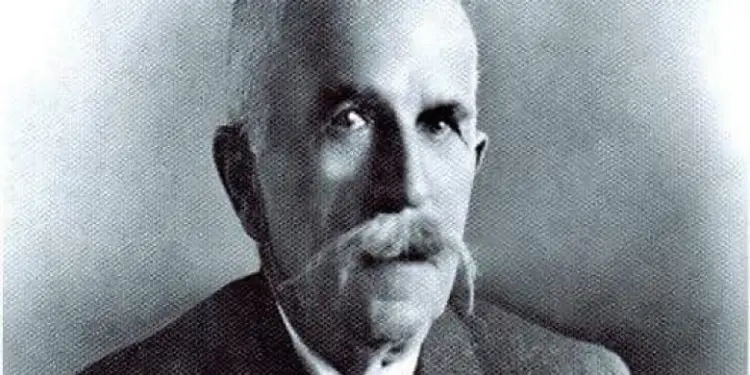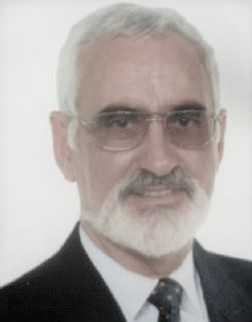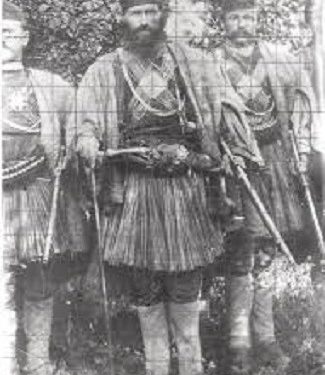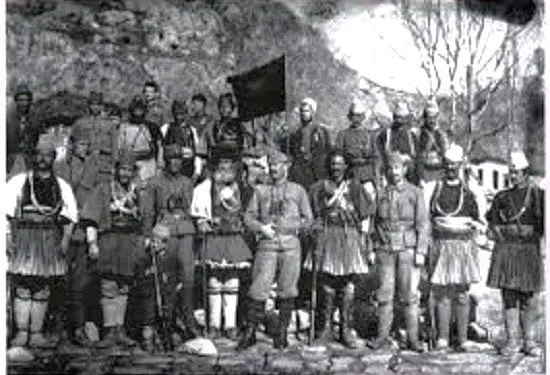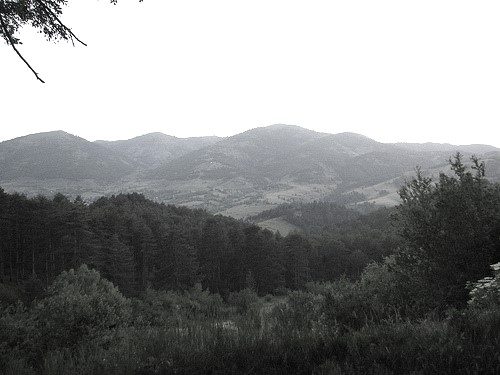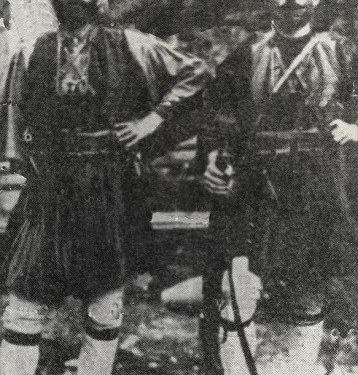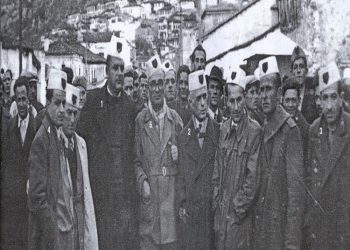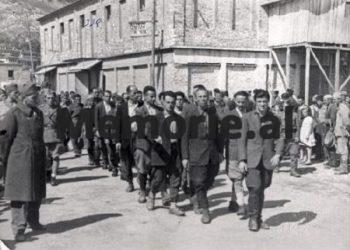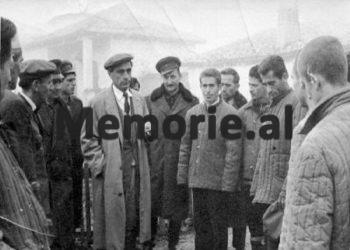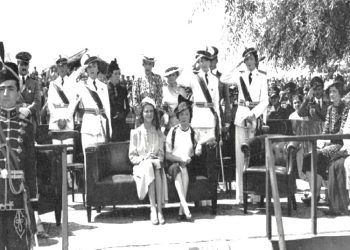By Prof. As. Dr. Thanas L. Gjika
– PETRAQ KATRO, CHRONICLE OF SALI BUTKA’S CHETA, EXPLAINS THE CAUSES OF THE BURNING OF VOSKOPOJA IN 1916 –
Memorie.al / The life and work of the patriot Sali Butka, commander of the chetas that fought for the freedom of the homeland against the Turkish invaders and then against the Greek invaders, has been evaluated by official Albanian science as a prominent patriot, collaborator of the brothers Bajo and Çerçz Topulli, of Mihal Gramenos, Themistokli Gërmenji, Ismail Qemali, etc. However, the anti-Albanian propaganda of the Greek chauvinist circles does not forgive Sali Butka for the defeat of the Greek military detachment, sheltered in Voskopoja in 1916, which is why they have fabricated slander against him.
Unfortunately, there are still Albanians today who, influenced by the distortions that Greek chauvinist propaganda has long fabricated, continue to repeat in the media, in cafes and in some scientific book, slanders such as “Sali Butka in 1916, carried out the third burning of Voskopoja!” Sali Butka was elected commander of the patriotic detachments of Kajo Babjeni, Qazim Panarit, Kozma Trebicka, Vasil Tromara, Hysen and Asllan Guri, etc., and led the march towards Korça, to join the forces of Themistokli Germenji.
The task of the forces led by Sali Butka was, together with the forces of Themistokli Gërmenji, to liberate the city and the surrounding areas of Korça from the Greek forces, who had been occupying them since July 1914. However, their path was blocked by soldiers from a detachment of the Greek army, who had taken refuge in several Greek-manager houses in Voskopoja.
During the years 1970-1996, when I worked at the Institute of Linguistics and Literature, studying the lives and works of our Renaissance men, I had formed the right conviction about the patriotic character of Sali Butka, who, together with his sons, fought for the freedom of the homeland. His eldest son, Gani Butka, in 1914, was martyred at the head of the colonial battalion, against the rebel forces of Haxhi Qamili, in Pogradec. I had opposed, both at home and here in exile, the erroneous opinions of some of my friends, who continued to blame Sali Butka for some thefts that one or two members of his gang had committed and especially for the burning of Voskopoja in 1916.
Now, after reading Petraq Katro’s book, I am trying to explain it even better to these friends and all readers, by reviewing Petraq Katro’s book, “Historical Chronicle: WHO WAS SALI BUTKA”, (Tirana 2020, editor Alfred Çako). The title of the manuscript, which the author had left in 1936, was “The Life and Patriotic Activity of Sali Butka”. The change of title was made to emphasize the chronicle character of the book, that is, to show that this book is based on original documents and not simply on the memories and interpretations of the author, who had been the secretary of Sali Butka’s brigade.
In the 1960s, the writer Sabri Godo, relying on the manuscript of Petraq Katro and several historical documents, compiled his biographical book, “The Old Man of Butka”, where he described the life and work of the patriot Sali Butka. However, the truth about the figure of this patriot did not take its rightful place, because many readers, influenced by the propaganda of Greek chauvinist circles, spread the opinion that the writer Sabri Godo had added situations and personal explanations from his imagination.
The reliability of the documents that are disclosed in the chronicle book of Petraq Katro is completely reliable since the documents are authentic and were given after the author’s niece, Mrs. Donika Katro Ristani, has briefly disclosed the life of the patriotic intellectual Petraq Katro. For this addition that she made to the original manuscript, she will have the gratitude of all readers…!
Petraq was born on November 21, 1892, in the family of the patriot Spiro Katro, in the village of Lavdar in Opar. This family, like all the Opar people, by blood, language and customs, was purely Albanian. It had an origin connection with the large family of famous Albanian painters and iconographers, KATRO. However, the Patriarchate of Ohrid, since it had Old Slavonic as its official language, translated the Albanian surname “KATRO” into the Slavic form, “ÇETIRI”. Therefore, their icons and paintings are signed with this surname.
Their icons are preserved today in several churches in Berat, Myzeqe, etc., as well as in the National Museum of Icons. Today, malicious Slavo-Madrian propaganda calls them Macedonian painters, although it has not been able to change their origin, as sons of the Opar region, while Aromanian propaganda calls them Aromanians from the village of Grabovo. The church painters lived for years in the villages where they painted. Perhaps in Grabovo, where an ancient Aromanian/Rëmën colony lived, speaking the Rëmënështi language, one or two of the painters of the second generation of this family may have been born.
Petraq’s father lived with the whole family in Lavdar and from there he dealt in the timber trade in the markets of Korça and Manastir (Bitola). He maintained ties with the Albanian patriots of the city of Manastir, such as the sons of the Qiriazi family, the Gërmenji family (Telemaku and Themistokliu), the Zavalani family (Fehmiu), etc. Since Spiro Kosturi stood out for his Albanianism, anti-Albanian forces killed him at Qafa e Bigllës, when he was passing through in 1905, the same year that they killed the clerical writer, Papa Kristo Negovani, along with his brother, Father Vasili.
Petraqi, the third son of the family, was born on November 21, 1892, after his brothers Marko and Vasil. He received his first lessons in Greek, at the village Greek school, and completed his secondary school with a commercial profile in Thessaloniki. The little orphan was financially supported by his two brothers, who had immigrated to Odessa, Russia, where they worked as bakers (oral account of Vasil Katro during the meetings I had with him in 1972-1973 in Korça, Th. Gj.).
When he finished these studies, the young economist, in addition to Albanian, also spoke Greek, French and Italian, but he did not stay to work in Thessaloniki and returned to Albania, which had just declared it an independent state, although the situation was turbulent. He settled in Korça, where he also took his mother. Here he became connected with the patriots of the city.
Inspired by the act of the insurgent poet Mihal Grameno, who in the years 1907-1908, had joined the Çerçiz Topulli detachment, as its fighter and chronicler, 23-year-old Petraqi joined the Sali Butka detachment, in 1915, to serve with rifle and pen. During the years 1915-1917, he actively participated in the detachment’s fighting, kept the necessary notes for the events, copied documents, etc. He later resettled in Korça, where he connected with well-known intellectuals, such as; Milto Sotir Gura, Dhori Fallo, Ilo Mitkë Qafëzezi, Petraq Harizi, Dhori Kotti, the teachers of the French Lyceum, especially with the director, Prof. De Courville, etc.
During the years 1923-1924, he was the responsible owner of the newspaper “Zëri i Popullit”. In the 1930s, he wrote his memoirs about the Albanian Republic of Korça, which he followed with memoirs about the life of Commander Sali Butka, which he completed in 1936. In this year, in addition to working as a French teacher in the lower grades of the French Lycée, Petraq continued to work as the owner of the Kauçuk factory, where galoshes, boots, open-toed shoes, rubber summer shoes, etc. were produced. However, Petraq Katros’ successes, his donations to churches and the poor, his participation in meetings with nationalists and in anti-fascist demonstrations, caused hatred for him among the authorities of the Italian occupation and among Enver Hoxha, his colleague at the French Lycée, the future dictator.
The Italian Carabinieri arrested Petraqi and interned him during 1940-1941, in Noventa, Vicentina, while Enver Hoxha’s hatred exploded wildly after November 1944. When he returned from Italy in 1941, Petraqi stayed in Tirana. There he became close to his nationalist friends, some of whom had joined the patriotic organization “Balli Kombëtar”, which had been created and led by Mit’hat Frashëri. He did not participate in military formations or in leadership positions of this organization. He continued to deal with the Rubber Factory, which became known as the “STIK” Company.
The communist government expelled him from Tirana in early 1945 as an “undesirable.” It nationalized his property and house in Tirana and forced him to move to Korça. Although Petraqi paid all his obligations to the state as a factory owner, the State Security organs arrested him along with his older brother on July 19, 1956, while they released his younger brother.
On January 18, 1947, the Tirana Military Court, without any facts, handed down its sentences, for Petraq Katro, 7 years in prison and for Marko Katro, 5 years, on the charge of “enemies of the People’s Government, who wanted to overthrow the Government.” Petraqi’s movable and immovable property in Korça was also nationalized, and he was sent from the Tirana prison to the Maliqi prison camp, where he continued his sentence. A little later, his wife was also arrested, and she was forced to clean the bathrooms of the Police building. Their only son, Piro, was left an orphan. The mother was released after serving her sentence, but being very ill, she only lived for two years.
Petraq Katro, after serving her sentence, was released. He settled in Korça, where he met his son and daughter-in-law and their two children: Aureli and Donika. None of his friends lived in Korça between 1955 and 1967. Some of them had left no heirs, and others had their children in Tirana or in emigration. On May 9, 1967, Petraq Katro, 75, died, ostracized and despised by the organs of dictatorial power.
Of course, the memory of this intellectual will remain immortal, not only through his descendants, but also through patriotic activity, memories, letters, documents and photographs, which have national values…! The rest of the book presents the life of Sali Butka, from birth until 1936, when the book was completed, two years before the death of the hero Sali Butka, who with his skills and courage, managed to defeat his Turkish, Greek opponents and the allied Austrian and French generals.
Since the life of Sali Butka has become known from many writings of historians, from the revised reprint of Sabri Godo’s biographical book (2014), and from the speeches and articles that were published on the occasion of the inauguration of his monument in Kolonjë, I will focus mainly on the documents that Petraq Katroja has included in his book. These materials fully explain the situation and the reasons why the battle was fought between the Albanian forces of Sali Butka and the forces of the Greek detachment, sheltered in order to have Voskopoja as a strategic point for the Greek army, to use it against the Albanian patriotic forces of Korça, led by Themistokli Germenji.
When the Albanian forces led by Sali Butka arrived in Lavdar of Opar, they learned that in Voskopoja, the forces of a Greek detachment were sheltered, which had to be removed from Voskopoja, to clear the area from the remnants of the Greek occupying forces. Captain Sali Butka dictated to his secretary Petraq Katros, this letter addressed to the Eldership of the village of Voskopoja:
“Lavdar, on October 13, 1916
TO THE OLD MANNER OF VOSKOPOJA
By decision of the Albanian Government and by order of the Austrian Command, we are forced to pass through Voskopoja, to go to Korça. Therefore, we kindly ask you, as brothers that we are, not to oppose and be the cause of making war between us, without any benefit, because as soon as you oppose us, you will be responsible, because we will come tomorrow.
Commander of the Albanian chetas
Sali Butka (d.v.)
The next day, S. Butka received the response drafted on October 13, 1916, in Greek, from the commander of the Greek forces, Captain Theodhoros Maromatis, with the name and surname written by him. This document is reproduced in the book, in the original Greek and Albanian, translated by the secretary Petraq Katro. Here I am reproducing the Albanian translation:
Voskopojë, October 13, 1916.
TO THE CHAIRMAN OF THE CHEETAH SALI BUTKA
Your letter addressed to the Eldership of Voskopojë, fell into our hands, found in the pockets of your envoy. We inform you in a definitive and categorical form, do not dare to come to Voskopojë, where there is a Greek army with national defenders, because you will find Greek sponges lined up in front and you will regret it.
Head of the Greek Detachment,
Theodhoros Maromatis Captain (retd)
This answer clarifies that the Greek forces were not a small group of 15-20 people, (as the liars of Greek propaganda say), but a complete detachment (battalion). After they had captured the messenger of the Albanian forces, they had taken the letter from him and handed it to the Greek captain. The latter, after having translated it into Greek, drafted his own response, without informing the Voskopoja Eldership.
The next day, explains Petraq Katro, Saliu sent the second letter, with Gaqi Leno, the nephew of Dhimitër (Bitër) Dallamanga, one of the representatives of the Voskopoja primacy:
Lavdar, October 14, 1916
TO THE LORD BITRI DALLAMANGO AND THE OLDERSHIP OF VOSKOPOJA
Yesterday we sent a letter to the Eldership of Voskopoja, but unfortunately, from the response we received, this letter has fallen into the hands of the Greeks and a Captain replied to us, in a threatening manner, so that we do not dare to approach the borders of Voskopoja, because we will regret it. Therefore, we are sending you this second letter, because we have the duty to explain and inform you that, based on the decision of the Albanian Government and with the permission and assistance of the Austrian Military Command, we are ordered to liberate all the lands of the Korça Kaza, with the borders determined by the Conference of Ambassadors in London, from all the remnants of the Greek army and from the Andarts, who continue to cause damage in our villages, tormenting the people and plundering.
Therefore, we inform you that you should not withdraw from us the few Andarts that you have there and some shepherds, who are looking for unrest and dare to oppose us. Any opposition will be to your detriment, because we will come with all the sacrifices, to continue our way to Korça and thus fulfill our sacred mission. If you understand your interest and that of Voskopoja, you must raise the national flag of Skanderbeg, and we assure you that; no committee from our chetas will enter Voskopoja, except Qazim Panarit with 10 friends, who has been ordered to, in agreement with you, appoint a local provincial governor and a number of gendarmes from your village to maintain order and peace in Voskopoja.
For any opposition, the responsibility remains with you.
With respect Sali Butka
Commander of the National chetas (d.v.)
Gaqi Lenoja, left Lavdari with this letter on Friday, October 14, 1916 and was ordered to take the reply to the village of Gjergjevica, the next day at lunchtime, Saturday, October 15. However, as the author of the book explains, the Greek commander and the Greek-Roman nobility of the village of Voskopoja drafted the response in Greek in the absence of the Village Head. They had stolen the seal and after drafting the response as they wanted, they had written the name and surname of the Village Head and had sealed the letter. I am giving here the Albanian version translated by Petraq Katros:
Voskopojë Village, October 14, 1916.
To Mr. Sali Butka
We received your letter and learned that you have decided to come to Voskopoja. We are informing you and you should know that we will never allow, because it is a sin, that the ancient Greek Voskopoja is trampled by the dirty feet of Albanians. We will never accept any other flag, except the Greek one, and we will fight it to the last drop of our blood.
The Villager of Voskopoja
That when Sali Butka arrived in Korça, he met lluka Fundo and he told him that he was not in Voskopoja when the letter-reply was written and that the village seal had been stolen by the Greeks of Vosokopoja.
The book continues with the description of the events. Most of the inhabitants of Voskopoja wanted the village to surrender without a fight, but the Greek soldiers and the Greek-speaking elite decided to oppose. The exchange of rifle shells began. Sali Butka, to scare the opponents, set fire to a nearby barn. From the house of the Greek-speaking Ilo Ziu, the Greek soldiers opened concentrated fire. The exchange of gunfire increased. The haystacks and the houses where the Greek detachment forces had taken shelter caught fire. The flames and smoke caused chaos. Many inhabitants of the surrounding villages rushed and set fire to many other houses. The looting of houses began and the terrified Voskopoja residents fled. Sali himself was robbed of his horse’s saddle, which he was carrying nearby.
Among the looters who began attacking the village houses, the author of the chronicle mentions the notorious thief, Malka Zvarishti. “Unfortunately, – he adds – Zenel Braçe, one of the commanders of Sali Buta’s squads, joined him. The Greek forces, after being defeated, abandoned Voskopoja in panic. Sali Buta followed them with his forces and when he reached them, he opened fire. In these battles, 6 Greek soldiers were killed, while the others were captured and taken to Korça”.
These letters, of great documentary value, clearly prove that the real culprits for the third burning of Voskopoja were not Sali Butka, but the commander of the Greek forces, Captain Theodhoros Maromatis, who refused to leave Voskopoja without a fight, as well as the neighboring villagers, who attacked to loot, incited by greed and the actions of the criminal Malkë Zvarishti. The intellectual patriot Petraq Katro has the merit of preserving the originals of these letters, along with the Albanian translation of the letters, which were drafted in Greek. He preserved these documents in his archive even after reproducing them in the manuscript book of 1936. Evidence of his formation and scientific conscience. Memorie.al




